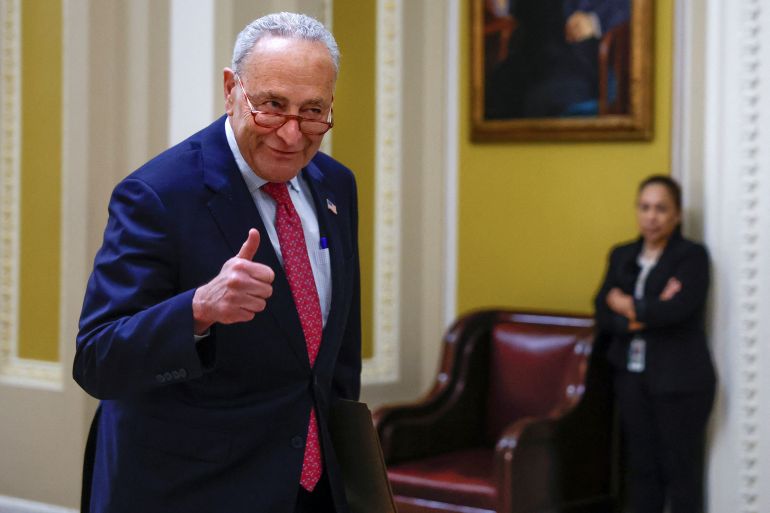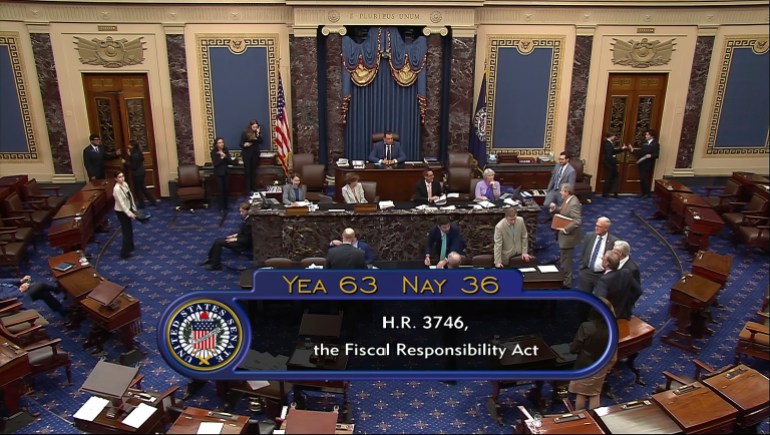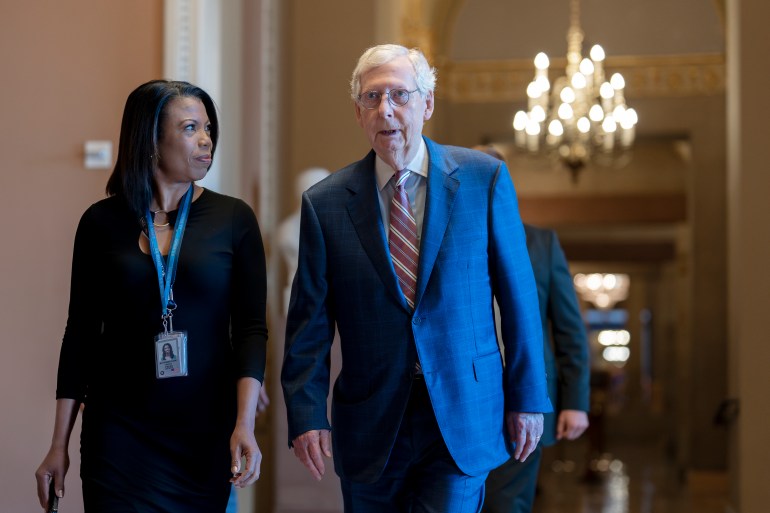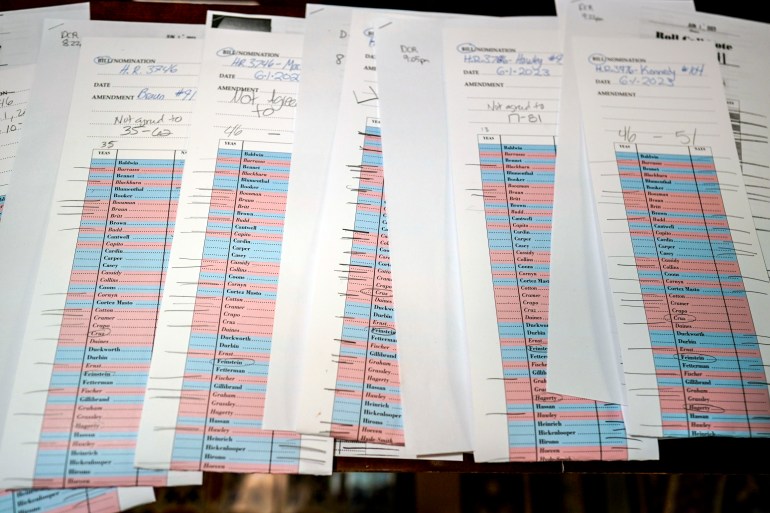Deal to raise debt ceiling passes US Senate, heads to Biden
The vote comes as the US hurtles towards a June 5 deadline to raise the government borrowing limit or face default.

The United States Senate has voted to approve a bipartisan deal that would increase the country’s debt ceiling, clearing the bill’s last major hurdle before it reaches the desk of President Joe Biden.
With Biden expected to sign the newly passed bill, Thursday’s decision is set to avert economic catastrophe, with only days remaining before the US was due to default on its debt on June 5.
Keep reading
list of 3 itemsAs per your politics, debt ceiling plan is good or a ‘disaster’
US debt ceiling deal: What’s in, what’s out of the bill
Senators voted 63 to 36 in favour of the legislation, which was thrashed out in often late-night negotiations between teams representing the Democratic Biden and Republican House Speaker Kevin McCarthy – two figures often at odds – last weekend.
It was passed by the House of Representatives on Wednesday.
“We are avoiding default tonight,” Senate Majority Leader Chuck Schumer said on Thursday as he steered the legislation through the 100-member chamber where the Democrats have a razor-thin majority.
Biden welcomed the bill’s approval as a “big win for our economy and the American people”. He said he would make an additional statement on Friday at 7pm (23:00 GMT).
Senate leaders push support for deal
In the lead-up to Thursday’s vote, Schumer and Minority Leader Mitch McConnell rallied support from their respective parties to back the deal, which would suspend the federal borrowing limit until January 2025.

On the Senate floor, Schumer, a Democrat, invoked the bill’s bipartisan success in the lower house as a model for the upper chamber to aspire to.
“Last night’s House vote was a resounding affirmation of bipartisanship,” Schumer said, pointing to Wednesday’s 314-to-117 tally in favour of the debt-ceiling deal.
Senators on both sides of the aisle came out against the bill, calling for amendments on everything from military spending to pipeline construction.
However, speaking to his Senate colleagues on Thursday, Schumer promised that the Senate would stay in session until a bill was passed, emphasising that the default date was a mere four days away.
“We will keep working until the job is done. Time is a luxury the Senate does not have if we want to prevent default,” Schumer said. He also blasted calls for changes to the deal’s language.
“At this point, any needless delay or any last-minute hold-ups would be an unnecessary and even dangerous risk. And any change to this bill that forces us to send it back to the House would be entirely unacceptable. It would almost guarantee default.”
In the event, the decision on the deal was preceded by a series of rapid-fire votes – limited to 10 minutes apiece – on the numerous amendments that had been raised, with a minimum of 60 votes needed for each of the amendments to pass.
Throughout the proceedings Schumer acted to move things along, reminding the Senators of what was at stake.
Concessions a selling point for Republicans
Meanwhile, McConnell, Schumer’s Republican counterpart, played up the conservative bona fides of the bill for a party starkly divided over its merits.
“The Fiscal Responsibility Act avoids the catastrophic consequences of a default on our nation’s debt. And just as importantly, it makes the most serious headway in years toward curbing Washington Democrats’ reckless spending addiction,” McConnell told the Senate.
On Tuesday, the Congressional Budget Office estimated that the federal government’s budget deficit could be reduced by $1.5 trillion through 2033 under the terms of the debt-ceiling deal.
That reduction would come primarily through the deal’s caps on non-military discretionary spending, which would be kept flat in 2024 and increased by only one percent in 2025. The bill would also claw back unused COVID relief money and funds previously awarded to the Internal Revenue Service (IRS), the government’s tax-collecting body.
The deal would also force the government to resume collecting payments from federal student loans, something that had been suspended during the COVID pandemic.

Debate over military spending
But Senate Republicans on Thursday came out strongly against the military spending allocated in the deal, arguing that it was too low to allow the US to compete on the global stage.
The debt-ceiling deal proposes to cap military expenditures at $886bn for fiscal 2024, a three-percent increase over this year. For the last fiscal year, 2022, the US spent $877bn on defence – the largest military budget of any country in the world.
Still, Senators like Maine’s Susan Collins and Arkansas’s Tom Cotton pointed out that the defence spending increase in the deal would be outpaced by inflation – a threat, they said, to US military might.
“This is not a threat-based budget. This is a budget of political compromise for people who have lost sight of what the country needs. We need safety and security,” Senator Lindsey Graham of South Carolina said in an impassioned speech. “Don’t tell me that a defence budget that is $42bn below inflation fully funds the military.”
Initially, Graham and other hawkish Republicans asserted that the Senate would keep debating until Tuesday unless more money was allocated to bolster the military and support Ukraine as it faces Russian invasion.
But afterwards, Graham returned to the floor to encourage Senate leadership to pursue a supplement to address concerns over military spending later this year. And Schumer took the podium himself in the midst of the amendment votes to speak directly to the criticism.
“This debt ceiling deal does nothing to limit the Senate’s ability to appropriate emergency supplemental funds to ensure our military capabilities are sufficient to deter China, Russia and our other adversaries and respond to ongoing and growing national security threats,” Schumer said.

Concerns from the left
More criticism was raised on the Senate floor by Virginia Democrat Tim Kaine, who objected to the inclusion of the Mountain Valley Pipeline in the debt-ceiling deal.
The 489-kilometre (304-mile) natural gas pipeline has been controversial in Kaine’s state, with protests launched to stop its construction from cutting through the Appalachian forest and private property alike.
“It would have been my intention to be a supporter of the deal despite its imperfections,” Kaine said, citing the pipeline as his main objection.
He introduced an amendment to strip the bill of the pipeline language.
“When you do a pipeline project and you approve it and you give a private company the right to take people’s land, you ought to do it carefully after significant deliberation.”
And on Wednesday, Vermont Senator Bernie Sanders posted on Twitter that he would be voting “no” on the deal in protest at the burdens he said it would place on the poor and middle class.
“I will be voting no on the debt limit deal because you do not do deficit reduction on the backs of Americans who are already struggling,” he wrote.

A deal long in the making
The hotly scrutinised 99-page debt-ceiling deal has been controversial on both sides of the political divide since it was announced on May 27.
Democrats condemned de facto budget cuts likely to affect social safety net initiatives. They also objected to additional work requirements added to the Supplemental Nutrition Assistance Program (SNAP), known as food stamps, as well as the Temporary Assistance for Needy Families (TANF) programme.
Republicans, meanwhile, denounced the fact that the spending cuts were not as steep as originally hoped.
Robert Koepp, the director of the Asia-Pacific Geoeconomics and Business Initiative at Chapman University in California, told Al Jazeera the reality of the compromises and side deals made last weekend was that the bill was “not nearly as substantial as they (Biden and McCarthy) are claiming.”
A previous 320-page bill – passed by the Republican-led House in April but threatened with a White House veto – would have slashed government spending and imposed a stricter limit on the debt-ceiling increase, lifting it by $1.5 trillion for about a year. It would have also taken aim at signature elements of Biden’s domestic policy, including tax credits for clean energy initiatives.
The Biden-McCarthy debt-ceiling agreement, however, was positioned as a compromise. It pared back some of the conditions Republicans placed on lifting the debt ceiling – while the Biden White House retreated from its initial demand for a “clean” increase, with no strings attached.